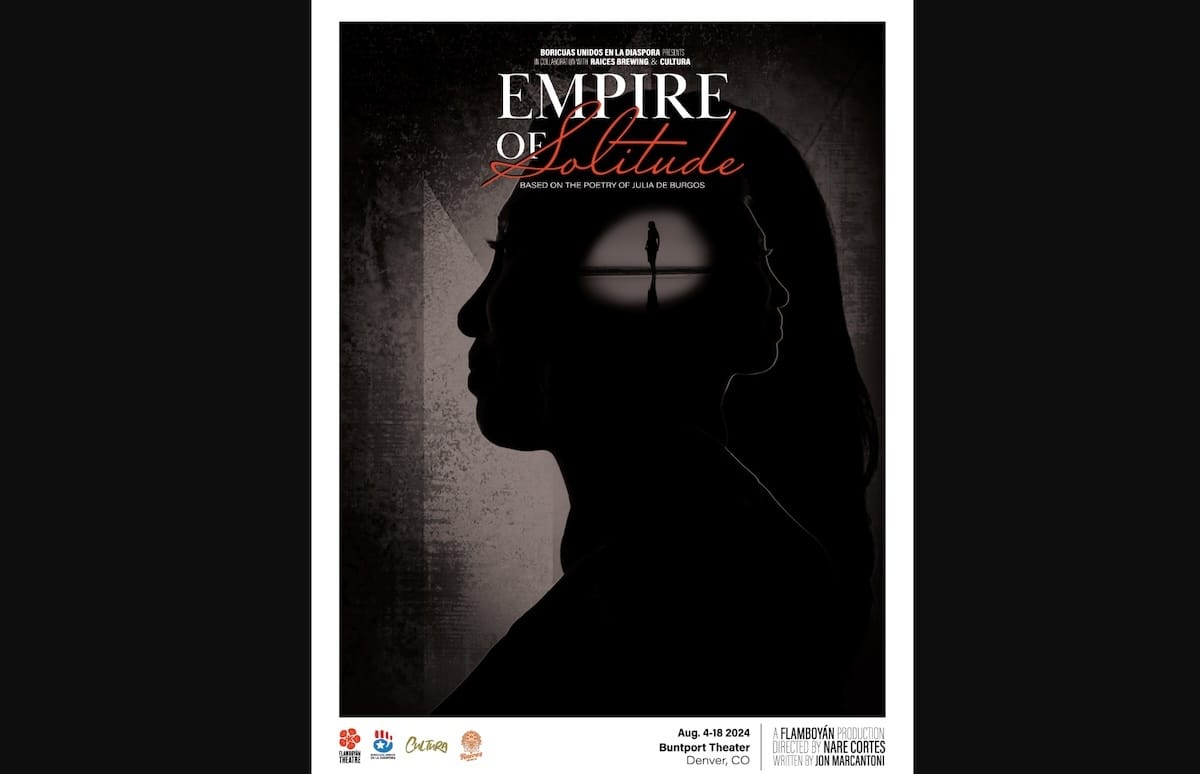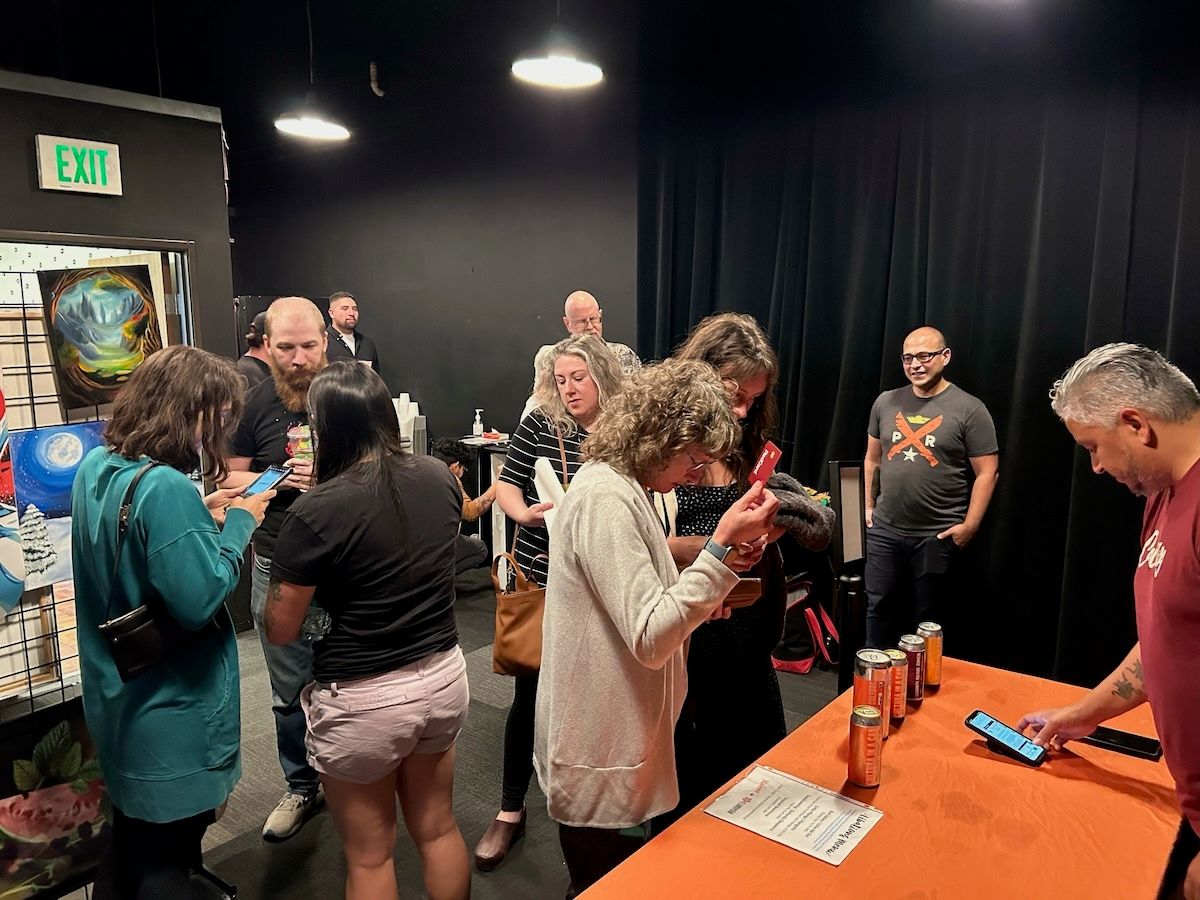
Via Flamboyán Theater
DENVER — If you had told me just a few years ago that I would sit down at a theater in Colorado and hear the names of Puerto Rican nationalists like Pedro Albizu Campos, Blanca Canales, and Gilberto Concepción de Gracia invoked with pride, I would’ve thought you were crazy.
But that’s exactly what’s been happening at Buntport Theater during Empire of Solitude, a new play from Puerto Rican playwright Jon Marcantoni and the first production of his Flamboyán Theatre—the state’s first boricua theater company.
Empire of Solitude is a groundbreaking piece in both form and subject matter. It tells the story of Julia de Burgos (1914-1953), the Puerto Rican poet who died on the streets of New York and was buried in a pauper’s grave before eventually being recognized as one of the great Latin American writers of the 20th century. The New York Times published a belated obituary for Julia de Burgos in 2018, 65 years after her death.
Her story, as told by Marcantoni in evocative prose that draws inspiration from de Burgos’ poetry, is essentially about independence. In the play, four characters representing various aspects of de Burgos’ persona argue and struggle for freedom.
Feminine (Shyan Rivera) yearns for freedom from the oppressive patriarchal norms of de Burgos’ time. The Wife (Jordan Hull) gives up some of her independence for the comfort of marriages that meet societal expectations. Poetess (Lucinda Lazo) finds in her words on the page the freedom she cannot easily achieve in life. And Revolutionary (Gisselle González) yearns for Puerto Rico’s political freedom from the United States.
Julia de Burgos was a fierce advocate for the island’s independence and served as Secretary General of the Daughters of Freedom, the women’s wing of the Puerto Rican Nationalist Party. She was surveilled by the FBI as part of its decades-long campaign to suppress the Puerto Rican independence movement. She lived and died in exile, believing that she would not be safe and free in Puerto Rico while it remained a U.S. colony.
The play’s title comes from one of de Burgos’ final poems, Farewell from Welfare Island—which, to be clear, is not a reference to Puerto Rico, but to what’s now known as Roosevelt Island in New York, then the site of a mental institution where she was committed.
Life was somewhere forgotten
and sought refuge in depths of tears
and sorrows;
over this vast empire of solitude and darkness.
Where is the voice of freedom,
freedom to laugh,
to move
without the heavy phantom of despair?
More than 70 years since de Burgos wrote those words, the United States can still feel like an empire of solitude for the millions of Puerto Ricans in the diaspora. We live, as the great Cuban poet José Martí once wrote, en las entrañas del monstruo—in the belly of the beast that continues to colonize our people.
Like Julia de Burgos, we Puerto Rico also despair over the freedom denied to our nation 126 years after it was invaded by the United States. And we feel the pangs of separation from our loved ones and from our beloved island, whose rivers and seas de Burgos immortalized in her poetry.
In the midst of that solitude, Flamboyán Theatre is a much-needed oasis. Marcantoni, who founded the theater company, says that one of his explicit goals is to create community among boricuas in the U.S., especially in places like Colorado that are hardly bastions of Puerto Rican culture.
But even here, there are tens of thousands of us, including the play’s director, Nare Cortés, and its lighting and sound designer, Michael Castro. And Marcantoni has made concerted efforts to bring us together. He has partnered with Puerto Rican businesses and organizations —including, full disclosure, my own: Boricuas Unidos en la Diáspora— and created space for Colorado-based Puerto Rican artists to sell their work on show nights.
Finding and building that community throughout the Puerto Rican diaspora is important. So is representation—especially when it’s more than skin deep and goes beyond mere identity. Empire of Solitude serves as an exemplar of political representation: it presents a pro-independence perspective that might’ve gotten Marcantoni thrown in jail in Julia de Burgos’ time, and that remains critically underrepresented to this day.

Photo by Alberto C. Medina
There is a moment in Empire of Solitude when you hear the chirp of a coquí, the tiny frog whose reverberant song serves as the soundtrack to Puerto Rican nights. When you’re on the island, you don’t even really notice it; their sound is so ever-present that you inevitably tune it out until it becomes background noise. But hearing it in Denver, it hits you like a freight train of homesickness that transports every Puerto Rican to our island. If the play achieved nothing else, that alone would be worth ten times the price of admission.
But there is another moment when the Poetess character says, simply but assuredly, “Puerto Rico must be free.” For those of us who believe it must, as Julia de Burgos did, those five words are even more powerful than the loudest coquí song. And until we leave this empire of solitude and return to our freed homeland, it makes us feel less alone.
Alberto C. Medina is a Puerto Rico-born, now U.S.-based writer, editor, and advocate for Puerto Rican independence. He is the president of Boricuas Unidos en la Diáspora (BUDPR), a network of Puerto Ricans in the United States who educate and organize for decolonization and sovereignty.
The Latino Newsletter welcomes opinion pieces in English and/or Spanish from community voices. You can email them to our publisher, Julio Ricardo Varela. The views expressed by outside opinion contributors do not necessarily reflect the editorial views of this outlet.
